Identity is Yours, and Yours Alone
A deep dive into ID2020 and universal digital identification
This is the final instalment in my four part series exploring vaccine passports and digital ID. Read the previous instalments here:
June 8, 2023: Liberty Dies in Your Pocket
June 9, 2023: How Mastercard Saved Africa
June 16, 2023: In the Name of Excelsior
Digital identity for all
On August 10, 2015, Dr. Alicia Carmona published a blog post on her LinkedIn profile titled “Digital identity for all? Seeking your feedback.”1
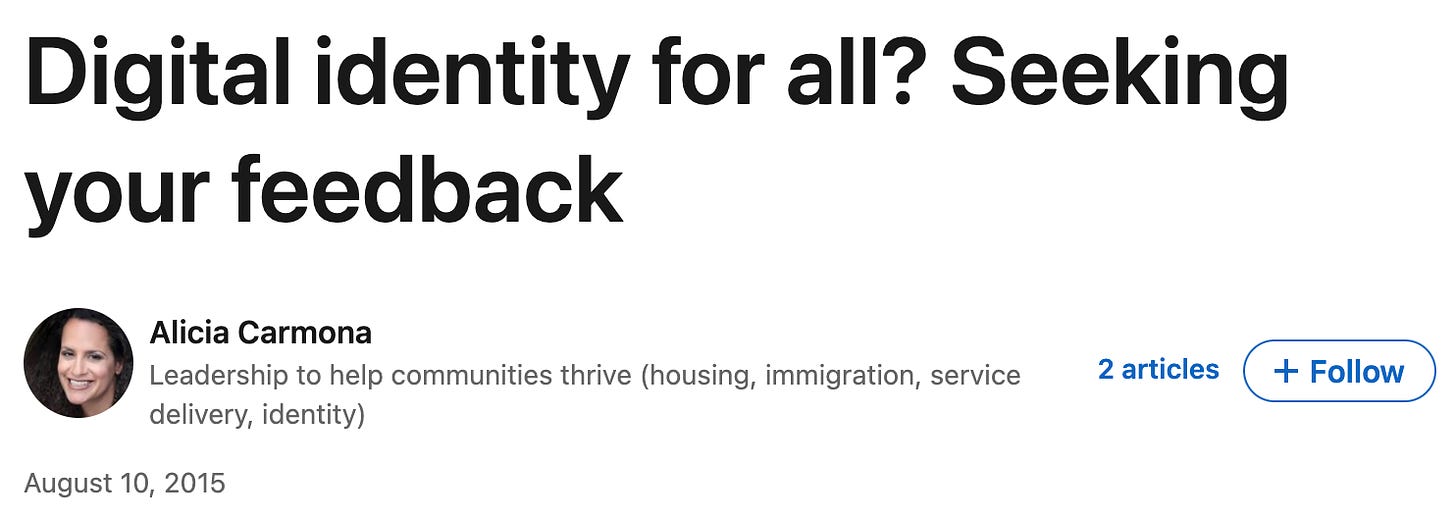
Carmona explained that she had recently started “working with a new non-profit initiative called Identity 2020,” which “seeks to develop tools that provide identity solutions specifically for social impact.” The new venture was planning to be “more formally launched and articulated in the very near future,” and in anticipation of this, Carmona decided to reach out to her networks to see if her colleagues could provide her examples out of their “field, institutional, or personal experiences where identification/identity is at the core of a community problem.”
Based on her writing, Carmona comes across as somebody who has spent years of her life working to improve the lives of others. She elaborates on the underlying source of her concern in the opening paragraphs of her post:
Those of us who work with immigrant populations are very aware of the ways in which people can be disadvantaged, victimized, and otherwise made vulnerable by a lack of some official form of identification. Being stopped by the police is the ‘classic’ problem faced by the undocumented in the US. Even those immigrants who are eligible to regularize their status are often stymied by a lack of documentation due to cost, poor infrastructure, bureaucracy, corruption, and various other inefficiencies. Insufficient identification makes it hard for them to open a bank account, obtain credit, rent a home or buy a car.
There are other examples globally, such as stateless populations where a lack of official documentation blocks people’s access to education, healthcare, and the ability to move freely. There are trafficked children who lack the identification that could prove their age or provenance, making it even more difficult to extract from them exploitative situations.
Her background — insofar as her LinkedIn profile is honest — supports her premise.2 She worked on a “Freedom Forum-sponsored project that examined the relationship between the media and economic trends” in the 90’s, and taught classes on “Latino Family and Gender” at Lehman College in 2009. From 2011 onwards, Carmona worked as an independent consultant for clients such as Catholic Charities of New York, Deutsche Bank's Anchoring Achievement in Mexican Communities Initiative, Sesame Workshop and the New York Academy of Medicine (through Summit Research Associates NYC), and the Office of the Superintendent of the Catholic Schools in the Archdiocese of New York. It is presumably in this range of positions that Carmona worked front and centre with refugees and others facing problems related to lack of official identification.
Carmona received feedback as requested — specifically, her LinkedIn post received 17 likes and 4 comments. Karin Wolman provided examples of how such a solution would not be limited to just aiding the “undocumented,” citing her own experience acquiring a New York City ID card, benefits from which included “arts & drugstore discounts!”
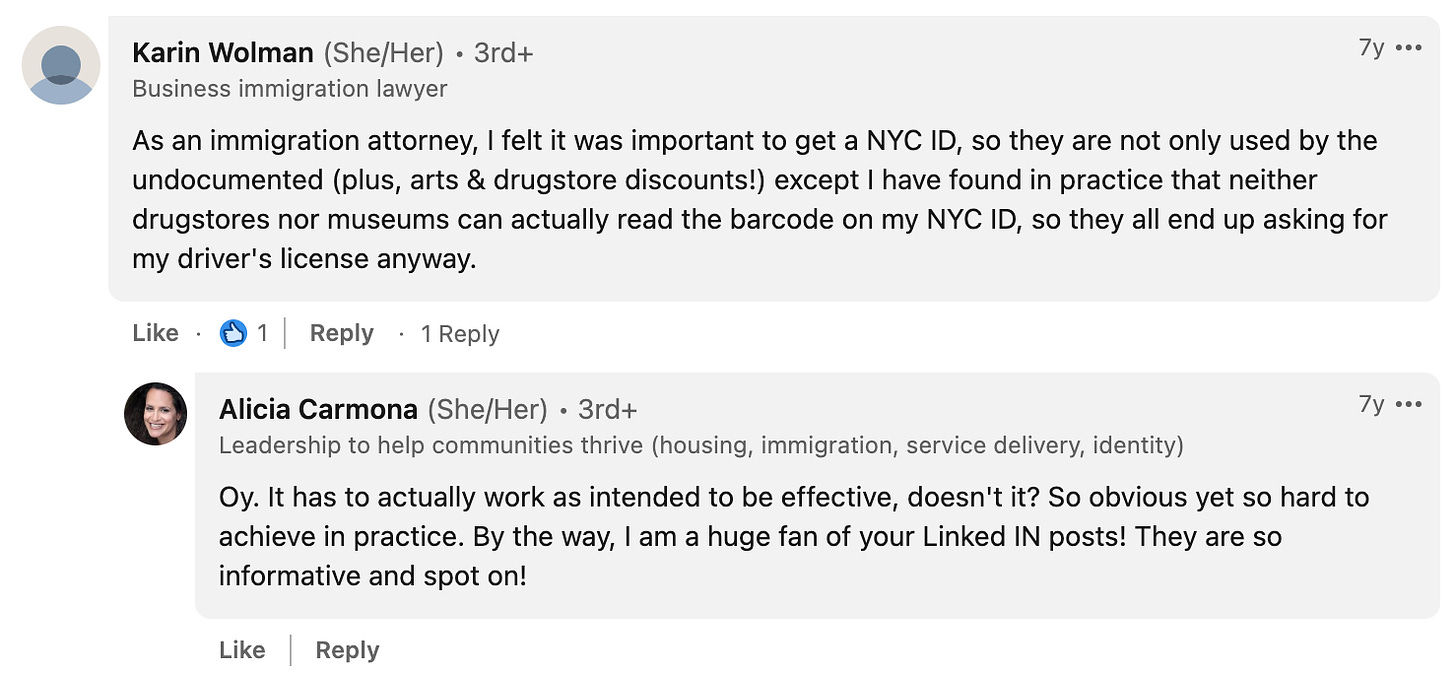
Sovrin Foundation
John Phillips also largely applauded Carmona’s initiative, but noted that ID2020’s global program objectives may be impeded because “not all countries follow UN rules”. Rather than this centralized, top-down option run by the United Nations, Phillips offered the example of the “decentralised” Sovrin Foundation. Not to worry, though - “NGO’s can play a huge role in getting people with no shareable identity their first identity.”
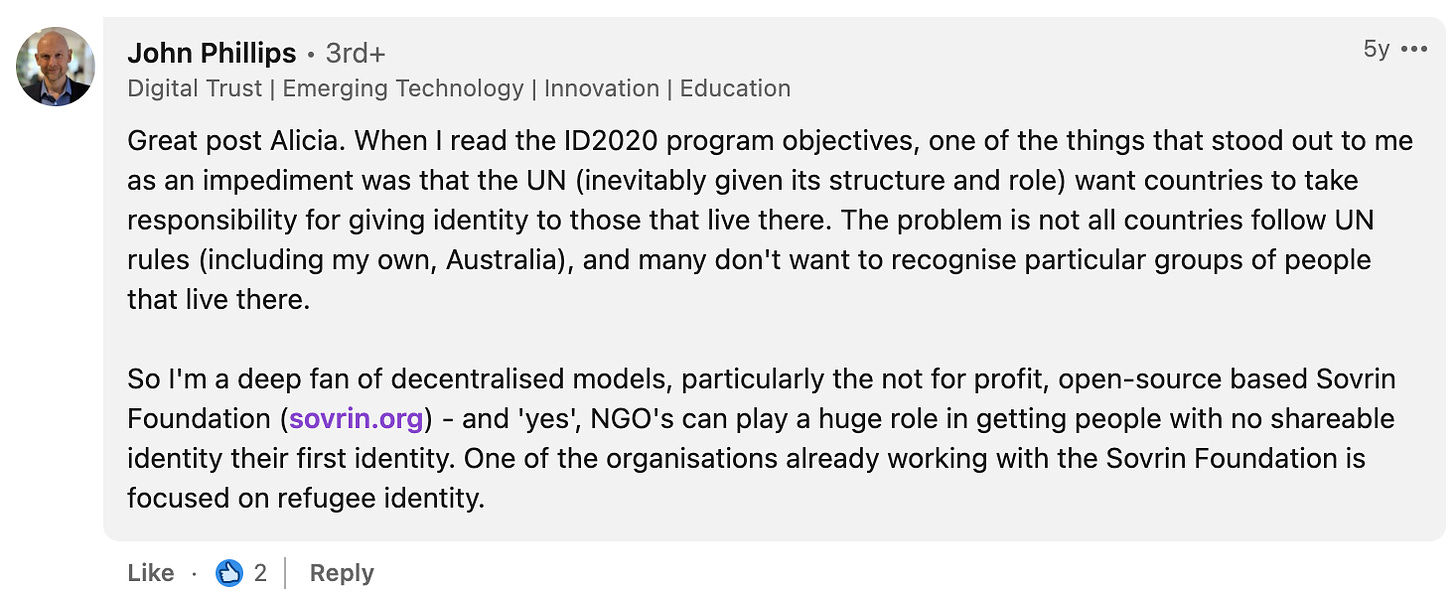
Among the organizations partnered with Sovrin between 2016 and today are:34
ATB Financial (a crown corporation owned by the Province of Alberta, the only such state-owned bank in Canada)5
Cisco
Hyperledger
IBM
iRespond (“an international non-profit organization dedicated to solving the identity problem using a unique digital biometric identity solution”)6
OrgBook BC (a digital credentials network for businesses run by the Government of British Columbia)7
Perkins Coie (a large international law firm sanctioned last year in relation to their financial dealings with the Democratic National Committee)8
As will be clear to those who have read my previous article, I am not surprised one bit to see IBM make an appearance behind yet another digital identity venture.
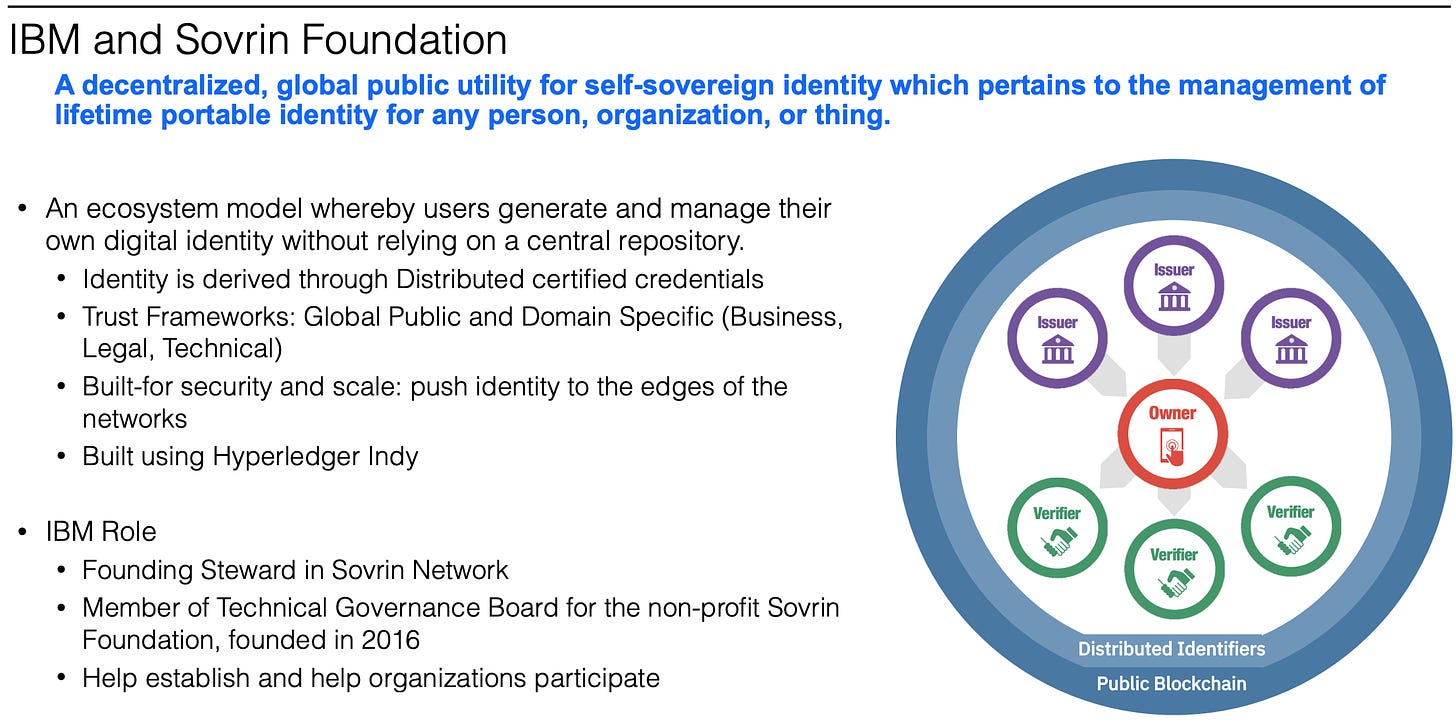
In fact, IBM played a significant role in Sovrin at the time of Phillips’ comment, acting as a founding “Steward” and a member of Sovrin’s Technical Governance board.9 The tech giant also co-led a joint research project with Sovrin and the Alberta-government-owned ATB Financial titled “Job-Creds”, which explored the “use of verifiable credentials in online authentication and authorization activities.”1011
A review of Sovrin’s annual reports — to cut right to it — reveals that the foundation went on to partner with the World Economic Forum, the World Bank Group’s Identity for Development (ID4D) and United States Agency for International Development (USAID) to “help achieve its mission and better define identification systems for global populations in need.”12
FIDO Alliance
But not all respondents were as enthusiastic about the idea. Perhaps sensing what the ID2020 project would inevitably become, Charles Moore offered that in his view, only a “Bring Your Own Identity” setup could work. It “requires no centralist entity,” replacing the need for governments in a “fully decentralised solution.” And, “the required infrastructure is already deployed.”

Charles also linked to an article of his titled “Your Identity is yours, and yours alone” in which he elaborates on the fundamental problem with the notion of “identity”:13
Modern society has muddled this concept of identity. Today, nations, corporations conflate driver’s licenses, medicare cards, and other state-issued identity-attributes or credentials with identity; this is problematic because it suggests a person can lose one's very identity, if a state revokes one's credentials or even if one just crosses nation state borders.
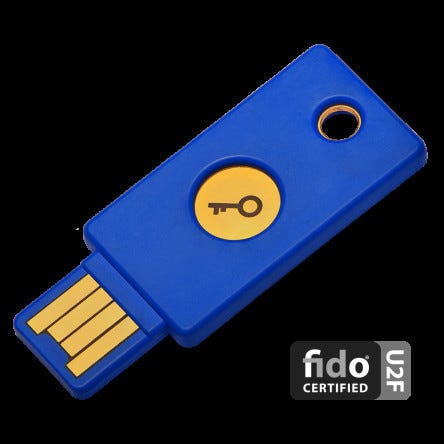
Despite this cautionary tone, Moore goes on to advocate for yet another digital identity solution (for better or worse). In this case, devices certified by the FIDO Alliance.
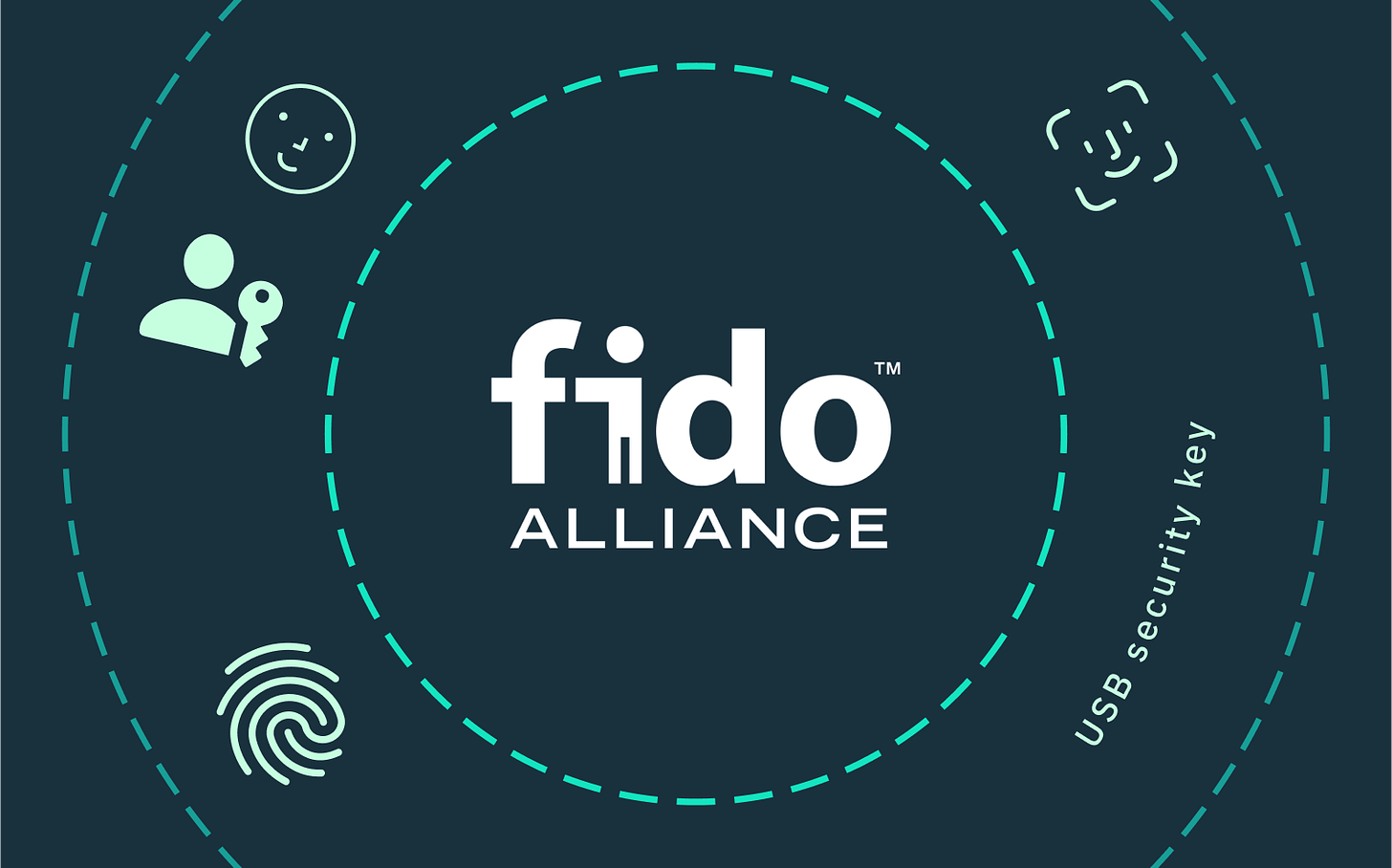
The FIDO Alliance (or “Fast IDentity Online”) is an American non-profit organization focused on “developing and improving security protocols to reduce the overreliance on passwords.”14 According to an article published on Stytch:
In 2009 PayPal discussed its proposal for using biometrics as an alternative way to authenticate users, instead of using passwords. These conversations inspired a new industry standard for passwordless access using public-key cryptography and local logging technologies. In 2012, the FIDO alliance (Fast Identity Online) was formed.
PayPal? Biometrics? Sounds like a fantastically safe alternative to the other options thus far suggested!
Members of the FIDO Alliance include:1516
Alibaba Group
Amazon
American Express
Apple
Bank of America
Binance
Cabinet Office of the UK Government
Chase Bank
Cisco
Daon
Digital Transformation Agency of the Australian Government
Goldman Sachs
Google
HSBC
Huawei
IBM
Intel
Israel National Cyber Directorate
Mastercard
Meta
Microsoft
Mozilla (as in Firefox)
National Institute of Standards and Technology (NIST)
PayPal
Salesforce
Samsung
Target
TikTok
Trust Stamp
Twitter
Vanguard
Verizon
Wells Fargo
Yahoo
Yup. All of the digital identity solutions presented in response to Dr. Carmona’s LinkedIn post are led, or predominantly supported, by the same corporate giants and renegade governments agencies from whom we everyday citizens are attempting to protect our privacy and sovereignty — including a few from countries who are ostensibly our “cyber-enemies,” like China.
But let’s turn back to Alicia Carmona’s baby: ID2020.
ID2020

The earliest archived version of ID2020’s website is from September 8, 2015. It featured a different logo, and was at this point still officially called “Identity2020 Systems” instead of the shorter name it would later exclusively adopt.
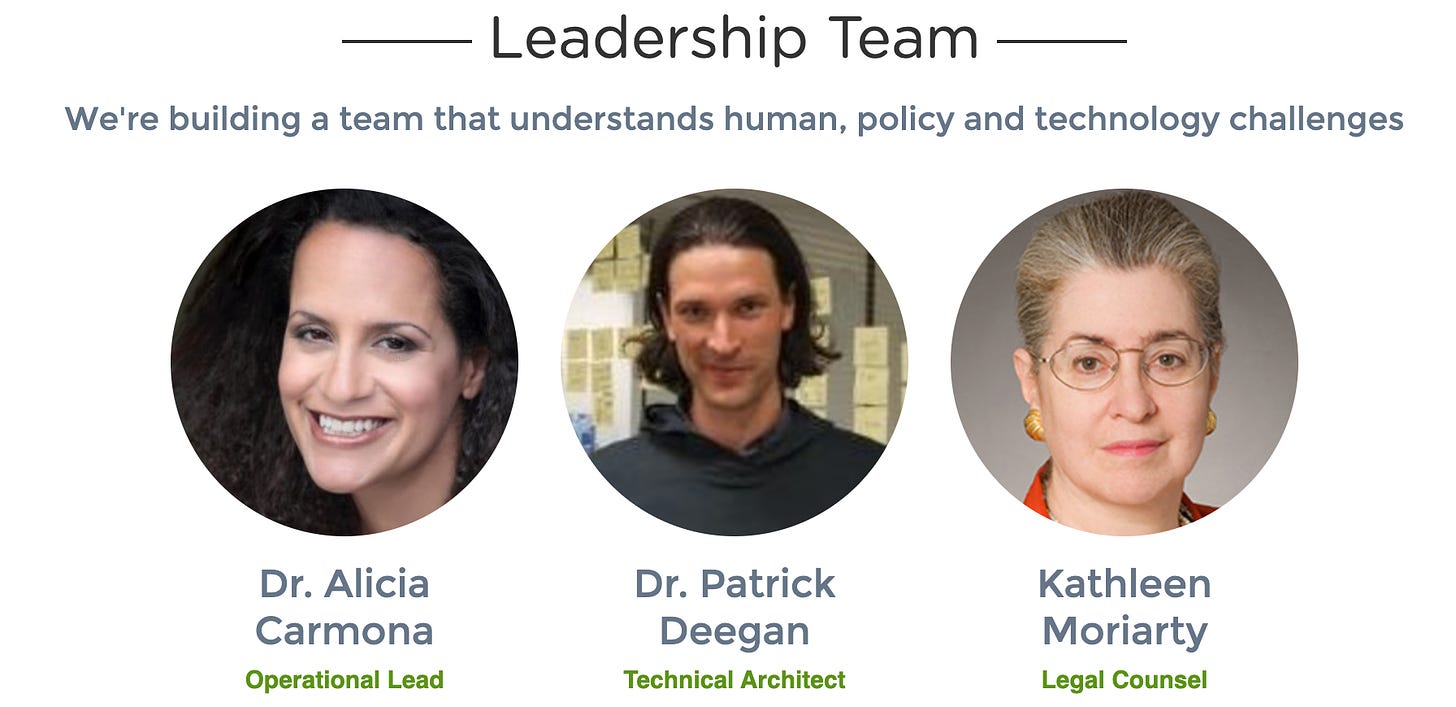
In addition to Angela Carmona, the initial team included Dr. Patrick Deegan, developer of the “Open Mustard Seed (OMS) platform,” and Kathleen Moriarty, a partner at law firm Kaye Scholer.17
Kaye Scholer was featured as a partner of ID2020, alongside Broadhaven Capital Partners and RedRose.
The portfolio of Broadhaven’s venture capital arm, Broadhaven Ventures, includes a number of notable consumer technology and cryptocurrency companies, such as:18
Boost VC, a venture capital firm invested in Colossal Biosciences, a biotech company seeking to resurrect the wooly mammoth under the leadership of George Church;19
CoinList
DISC Holdings (we’ll come back to this in a bit)
Etherscan
Filecoin
LendingClub, a portfolio company of Plug and Play20
Lyft
NEAR Protocol, heavily invested in by Sam Bankman-Fried’s Alameda Research21
Polychain Capital, an investor in the BBS Network,22 which hosts a joint message board for the Global Covid Summit and the Decentralized Medical Network (DeMed), both projects of Roundtable Media2324
The Chernin Group (TCG), whose own portfolio includes COVID-19 test kit maker Everlywell,25 Medium and its competitor, Substack, NFT marketplace OpenSea, music companies Sofar Sounds and SoundCloud, Tumblr, Twitter and Yahoo2627
RedRose, on the other hand, is more of an enigma. The button from the archived ID2020 page leads to a strange-looking website that disappears from the web within less than a year. ID2020 is listed on Crunchbase as a sub-organization of RedRose Group,28 also called RedRose Ventures, RedRose Technology Industries or RRVIG.
According to its own Crunchbase profile, “RRVIG is the holding company of a set of synergistic digital economy operating companies with a focus on innovation in financial technology, blockchain and digital identity.”29 Another sub-organization listed alongside ID2020 is Expense Circle, which “delivers systems to reduce friction and operating cost by increase (sic) transparency in expense management.”30 Or, rather, it did, given that it has also been strangely wiped off of the internet.
John Edge
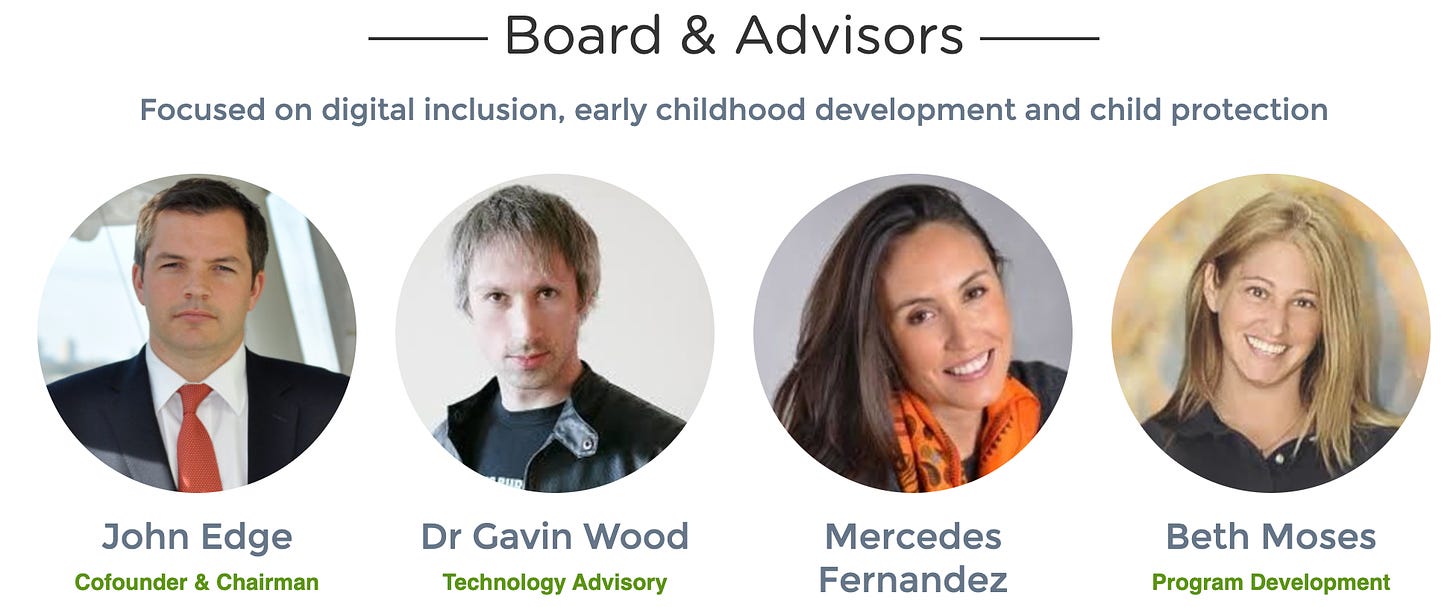
What ID2020 and RedRose have in common is their listed founder: John Edge.
According to his LinkedIn profile, Edge studied at the University of Leeds from 1993-1997 where he focused on — of all things — “bio medical engineering and the research of machine systems to replace damaged physiologies.”31
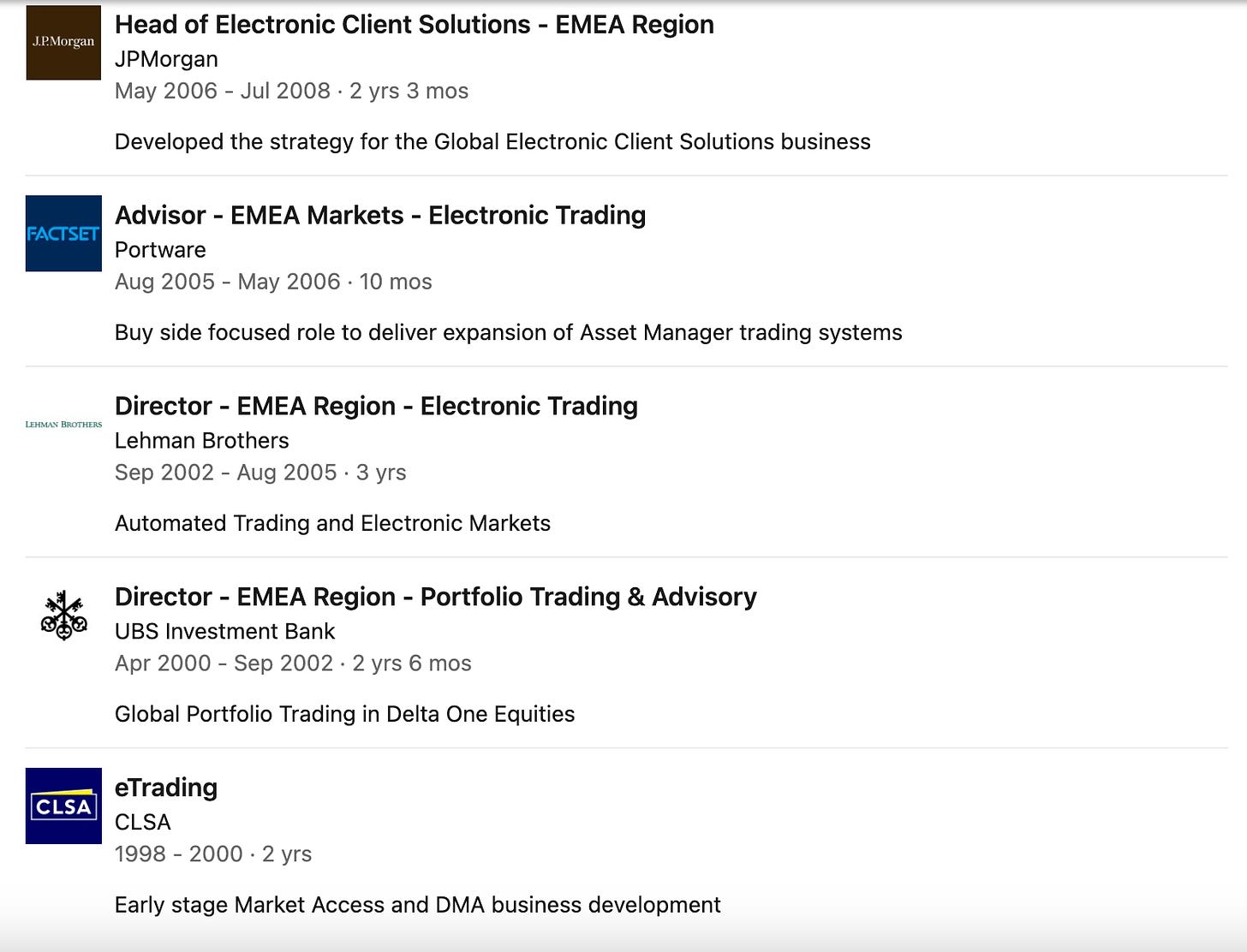
He then held a series of rather similarly-named positions across a variety of financial services companies, including CLSA (1998-2000), UBS Investment Bank (2000-2002), Lehman Brothers (2002-2005), Portware (2005-2006), and eventually winding up at JPMorgan Chase from 2008-2012.32
While there, he claims to have co-invented a patent to detect insider trading, though his name does not appear on the patent itself.33 The patent was originally assigned to RedKite Financial Markets, which Edge co-founded in 2008; it was then re-assiged to Fortent, a financial security company, before ultimately winding up under the ‘administrative agency’ of JPMorgan Chase in 2016.34
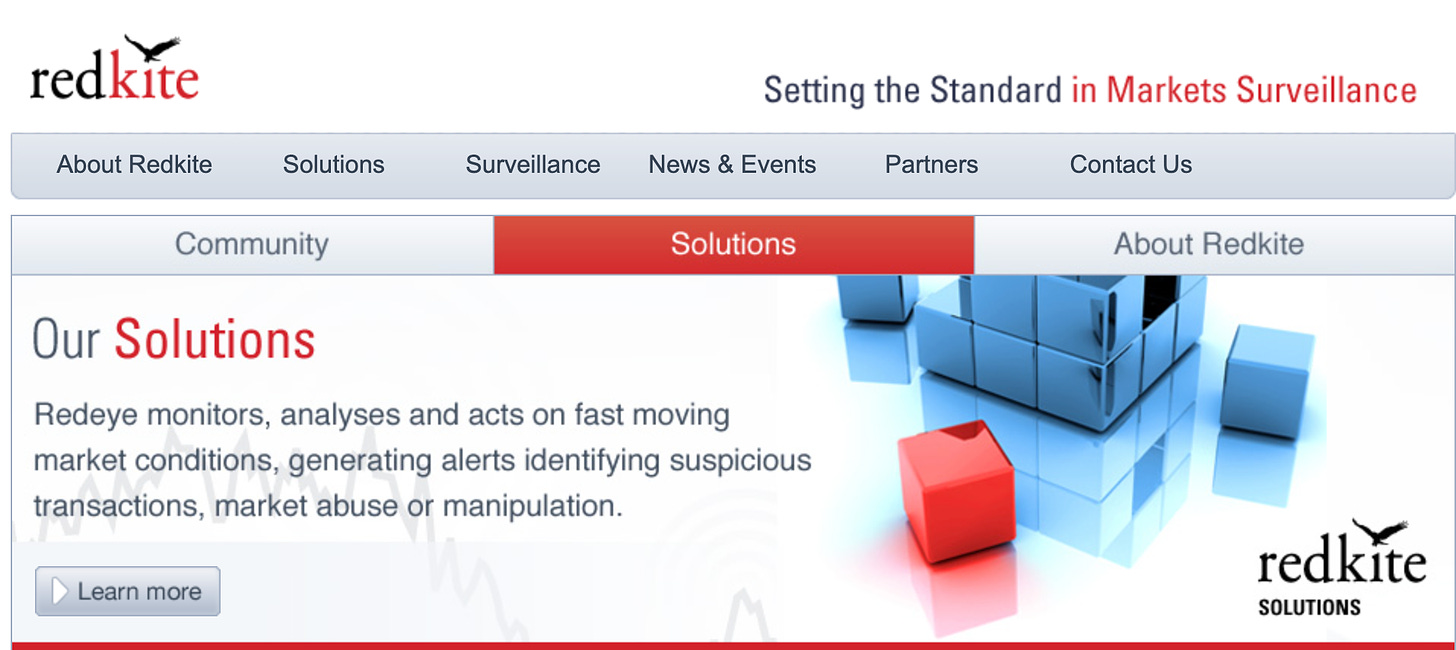
As Edge’s patent would suggest, he reportedly founded RedKite Financial Markets “to equip financial institutions with the tools and knowledge to better monitor their trading activities.”35 The company was purchased in 2012 by NICE Systems, where Edge continued to work until April 2014.
Using the money he retained from the sale of RedKite, he started up “a synergistic group of operating companies that span education, social impact and revenue generation business models, with a focus on the digital economy and blockchain technologies.”36
GovCoin

One such venture was GovCoin Systems, which was later renamed to DISC Holdings. Recall that DISC Holdings is a portfolio company of Broadhaven Ventures, which is also where Edge began working as an Operating Partner in April 2014 — the same month GovCoin launched.
GovCoin is the term commonly used to describe Central Bank Digital Currencies (CBDC).37 Starting in May 2016, GovCoin carried out a trial with the UK Government’s Department for Work and Pensions (DWP) which “saw 20 to 30 participants being paid their benefits through an app” using distributed ledger technology.3839
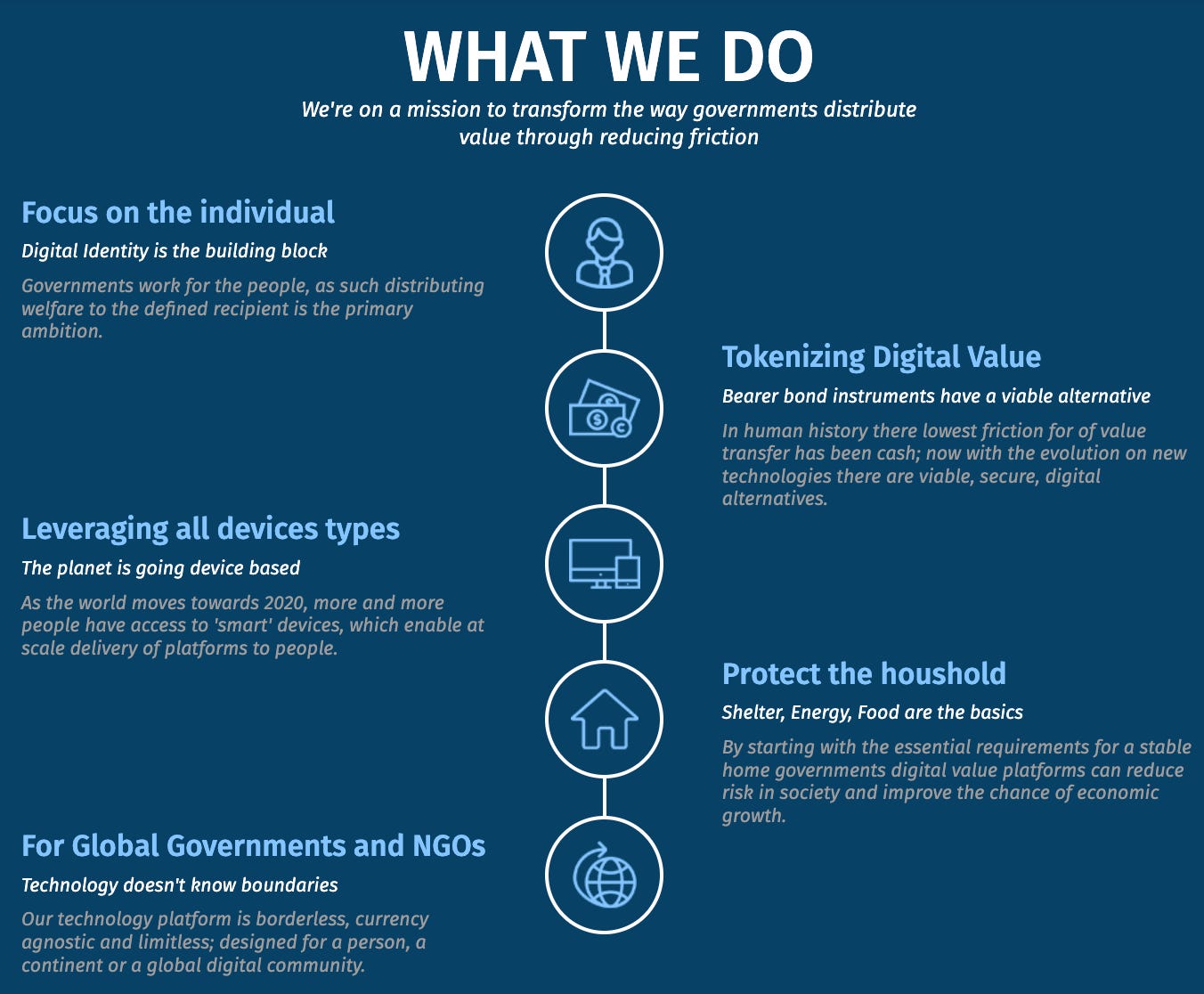
In the above infographic from their website, GovCoin lays out their entire framework to “transform the way governments distribute value.”40
Digital ID is the building block. In GovCoin’s system, digital ID is a necessary inclusion, though it’s unclear what the argument against currently-existing physical forms of ID would be.
Tokenized digital currencies will replace cash. And not just physical money — GovCoin explicitly seeks to replace “bearer bonds,” or negotiable instruments (which cash represents).
Smart devices will be used to scale up the system. Smart phones are one thing, but what could the government possibly need to do with your smart fridge or your Tesla in the context of sending you benefit payments?
Housing, energy and food will all be attached. Instead of providing you with benefit money to make your own decisions with, the system will put your home, food and energy into the hands of the government to manage.
Global government and NGOs are the client. The system ignores national borders, erases the value of money and provides a framework to establish and manage global governance — if you can afford to pay for it, of course.
This package of ventures, spanning CBDCs, financial surveillance and digital identity should not be surprising to readers at this point. In fact, DISC is an acronym for Digital Identity Security Company.41 The following screenshot is from a September 2018 archive of one of DISC’s websites, yet another mysterious and now non-existent part of John Edge’s ledger.
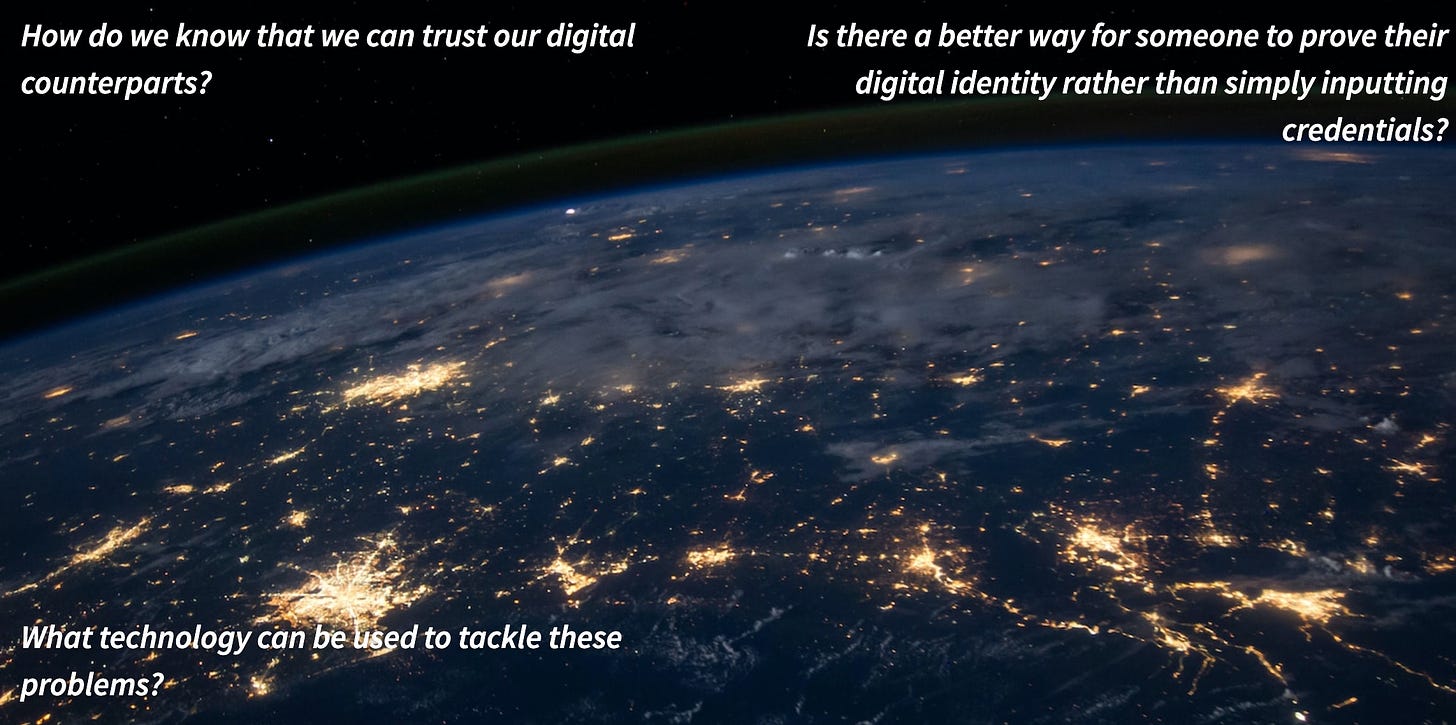
Needless to say, another one of these ventures was ID2020 itself. According to an article from SecureIDNews, Edge was inspired in June 2014 after seeing a screening of a film called Meena, which recounted a true story about child sex trafficking in India.42
A panel of experts took questions afterward, including Susan Bissell, chief of child protection at international humanitarian group UNICEF. “Susan articulated that one of the biggest problems in protecting children who are at risk of sexual violence is a lack of birth certificates or identity,” Edge says.
The film got his attention. He saw the identity issue as a technology problem and was immediately moved to put his background in business and financial services to work.
He went home and sketched out a plan, offering details to Liu the next day over lunch. “I’d recently sold my company, and I was looking for a purpose,” Edge says. “So, ID2020 was started on the 27th of June, 2014 – the day after I saw ‘Meena.’”
2020 was the year Edge set as his deadline “to create a system… that would be technically and legally compliant for children regardless of nationality, origin or status.”
In December 2014, Edge co-founded the Whitechapel Think Tank “as a forum to build an understanding of the opportunities and challenges presented by distributed ledger technology (‘blockchain’) and consensus systems.”43

His cofounder was Jeremy Wilson, vice-chairman of Barclays Corporate Banking.44 At the time of Whitechapel’s founding, Wilson was also serving as a member of the World Economic Forum’s Global Advisory Council on Forests.45 He would go on to join the WEF’s Global Futures Council on Blockchain in October 2016,46 and become an originating member of the Digital Pound Foundation, advocating for the introduction of a Central Bank Digital Currency to replace the British pound.47
The Whitechapel Think Tank was cited in a January 2016 report by the UK Government Chief Science Advisor titled “Distributed Ledger Technology: Beyond Block Chain”:48
The newly-created Alan Turing Institute, working with groupings such as the Whitechapel Think Tank, could play an important role in co-ordinating and ‘self-organising’ the public and private research and development sector interested in this and related technologies. The private sector should consider investing in the Alan Turing Institute to support the pre-competitive research that will ultimately facilitate new commercial applications that are robust and secure.

Notably, the Alan Turing Institute’s partners and funders include:49
Accenture
Autistica
Bill & Melinda Gates Foundation
Food and Agriculture Organization of the United Nations
Francis Crick Institute
GCHQ (an intelligence agency of the UK)
Health Data Research UK
Imperial College London
MI5 (another intelligence agency)
Microsoft
Ministry of Defence of the UK
Mozilla
National Health Service (NHS)
Office of National Statistics (ONS)
Public Health England
Public Health Scotland
Roche
TransUnion
United Nations Development Programme (UNDP)
Ah yes, another robust public-private partnership. It is with this group that the UK government suggested, through their report, that the Whitechapel Think Tank should work with.
And who signed off on the report? None other than Matt Hancock, whose work in the UK government during the COVID-19 era has led to glorious condemnation.

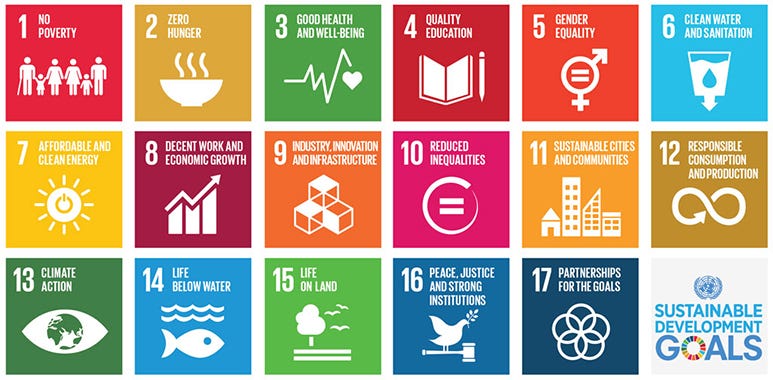
Though it wasn’t set until after ID2020 was founded, Edge and his team adjusted their official roadmap and timeline in response to the United Nations 2030 Agenda for Sustainable Development upon the adoption of the Sustainable Development Goals in September 2015.50
According to an archived version of his personal website from April 2016, John Edge was “focussed on facilitating, through Public-Private Partnerships, the creation of a billion legal identities with the ambition of saving the world $1 trillion a year in frictional costs in financial services.”51 On a page titled “Context”, he elaborates on his motivations:52
I am passionate and committed to forwarding the agenda for the UN Sustainable Development Goals. My focus Goals are:
Goal 1.4: Ensure that all men and women, in particular the poor and the vulnerable, have appropriate new technology and financial services, including micro-finance)
Goal 16.9: By 2030, provide legal identity for all, including birth registration.
With this kind of commitment, and the professional connections John Edge has, I am no longer confused as to how this strange little startup initiative wound up launching at the United Nations, shoulder-to-shoulder with the largest corporations in the world.
ID2020 goes big

On May 19, 2016, ID2020 announced it had partnered up with PricewaterhouseCoopers as the “lead sponsor of the landmark ID2020 Summit to create technology-driven public-private partnerships to achieve the United Nations 2030 Sustainable Development Goal of providing legal identity for everyone on the planet.”53
The inaugural ID2020 Summit took place the very next day at the United Nations headquarters in New York City. Among the event’s participants were Accenture, Barclays, BlackRock, Cisco, Deloitte, the Government of Estonia, Gavi, the Vaccine Alliance, Google, IBM, Infosys (a family venture of current UK Prime Minister, Rishi Sunak),54 JPMorgan Chase, Microsoft, MIT Media Lab, Nasdaq, the Omidyar Network and several dozen more.55
According to ID2020’s official press release following the event, some of the takeaways were:
Identity is a prerequisite of the Sustainable Development goals.
The private sector has expertise and technology that could significantly accelerate “access to digital identity.”
A public-private partnership is needed in order to coordinate efforts to implement the technology in ways that are “appropriate, secure and sustainable.”
“Sweeping commitments from conference attendees to contribute towards the shared goal of universal digital identity.”
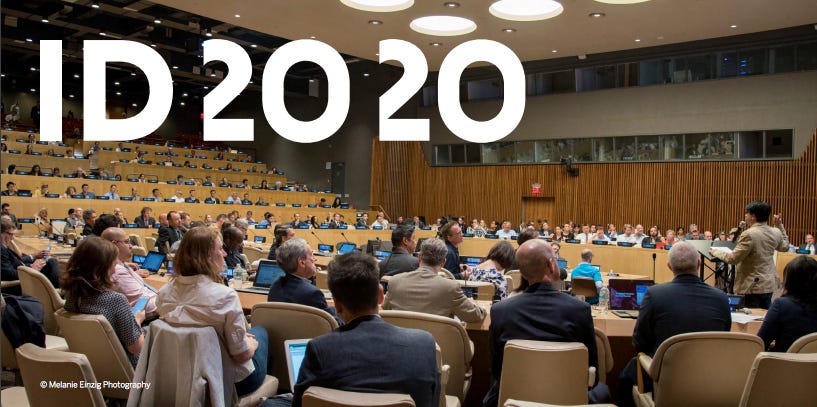
The second annual summit took place in June 2017, once again at the United Nations.56
This year’s gathering, entitled “Platform for Change,” launched the ID2020 Alliance, a consortium of public and private organizations committed to improving lives through digital identity. Accenture, a founding member, announced a $1 million investment in the ID2020 Alliance, marking a key turning point in the effort to make secure digital identity for all a reality by 2030.
Perhaps the most important takeaway from the 2017 summit was this:
For digital identity to meet the needs of governments, international organizations, businesses and individuals alike, interoperability is absolutely crucial. Dr. Pramod Varma, the chief architect of Aadhaar, demonstrated how taking a platform approach based on open standards and an open API facilitates vendor neutrality, encourages continued innovation and allows an ecosystem to develop around the technical platform.
This, of course, is exactly what happened through the widespread adoption of the SMART Health Framework, as explored in detail in my previous article.
Gavi, the Vaccine Alliance was also highlighted as the “model” on which ID2020 would be built. This would come to manifest in more ways than one in just a few short years.
The Rockefeller Foundation and Microsoft would soon join Accenture in the initial membership of the newly-formed ID2020 Alliance,57 as well as the Bill & Melinda Gates Foundation, the Biometrics Institute, Gavi, Harvard University, Hyperledger, IBM, iRespond, Mastercard, the New America Foundation, Open Society Foundations, Reuters, the Sovrin Foundation, Standard Chartered Bank, Thomson Reuters, the Unique Identity Authority of India, the United States Department of the Treasury, a variety of United Nations agencies, the United States Agency for International Development (USAID), the World Economic Forum, and the World Food Programme.
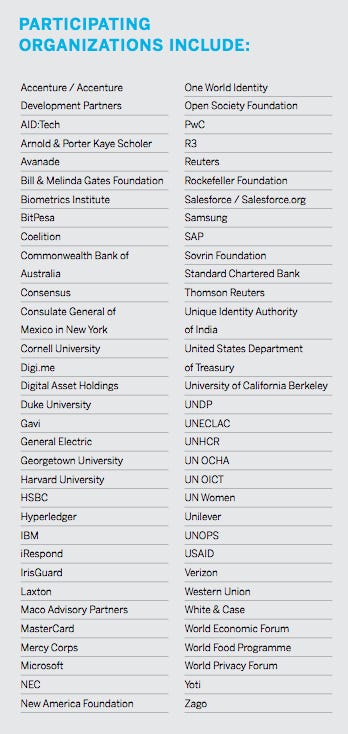

The third summit took place on September 14, 2018, with a specific focus on defining a “good” digital identity.58
Two pilot programs were announced at the event. The first, led by iRecover and the International Rescue Committee (IRC), involved deploying “blockchain-based digital identification, linked to individual users through iris recognition, for refugees accessing the IRC's services in the Mae La Camp in Thailand.” As described in the associated press release:59
Initially, these digital identities will enable the recipients to access improved, consistent healthcare within the camp through an accurate and secure electronic medical record. In the future, the same system may electronically document both educational attainment and professional skills to aid with employment opportunities.
The second program, led by cryptocurrency company Everest and the Government of Indonesia, involved the “transfer of liquid propane gas (LPG) subsidies by delivering them to a biometrically validated digital wallet over a transparent and low cost blockchain.” In other words, carbon credits as a cryptocurrency.
Not long after the summit, Gavi, the Vaccine Alliance announced a program with Simprints and NEC to “to use biometrics to increase immunization coverage in developing countries.” The program aimed to begin testing in early 2020 in Bangladesh and Tanzania, “and if successful, will progress to linking children’s digital identities with their vaccination records.”60
The fourth ID2020 summit took place on September 19, 2019, with a renewed focus on the so-called “Good ID Challenge.”61
At the event, the alliance announced a new initiative with Gavi, the Vaccine Alliance and the Government of Bangladesh to “leverage immunization as an opportunity to establish digital identity.”62 This was in additional to the prior announcement from June.
Anir Chowdhury, head of Bangladesh’s Access to Information Program, was quoted in Biometric Update as saying:
“The Government of Bangladesh recognizes that the design of digital identity systems carries far-reaching implications for individuals’ access to services and livelihoods, and we are eager to pioneer this approach.”
How nice of Mr. Chowdhury to have that kind of foresight. Perhaps that was the idea.
Seth Berkeley, CEO of Gavi, said that he was “enthusiastic about the potential impact of this program not just in Bangladesh, but as something we can replicate across Gavi-eligible countries, providing a viable route to closing the identity gap.”
ID2020 and COVID-19
Rather than the usual in-person summit, ID2020 decided to go online in response to the declared COVID-19 pandemic. Needless to say 2020 was a significant year for the initiative, given that its entire premise was to prepare for global digital identification by the decade’s turning. And here they were, ready to go.
Four webinars were held in October and November 2020:63
October 1: Good Digital ID for All: How Do We Get There?
October 15: Digital Immunization Certificates: Designing for a New Era in Global Health
October 29: Reaching the Last 30 Percent: Digital ID for Financial Inclusion…and More!
November 12: Laying the foundation: Digital ID for the Next Generation
“Digital Immunization Certificates” and “Digital ID” in the same breath, once again! But of course, as we well know, ID2020 is years behind many of its member companies (like IBM and Mastercard) in their development of vaccine passport technologies, potentially posing a problem with their goal of “interoperability.” Not to worry - they thought of that, too.
Good Health Pass Collaborative
On February 9, 2021, ID2020 launched the Good Health Pass Collaborative “to encourage interoperability between the COVID-19 health credentialing solutions being developed by numerous organizations.”64
Members of the collaborative include:65
Accenture
Amadeus IT Group (the airline booking company that signed on with IBM’s Health Pass)
CANImmunize
The Commons Project (the World Economic Forum-led initiative closely associated with the SMART Health Cards)
COVID-19 Credentials Initiative
Daon (the company behind VeriFly, partnered with New York’s Excelsior Pass)
Deloitte
Hyperledger
Mastercard
IBM
Salesforce
Sovrin Foundation
Trust Stamp (partnered with Mastercard’s Wellness Pass for COVID-19)
On August 1, 2021, the collaborative published an “Interoperability Blueprint” for developing and deploying a “Good Health Pass”.66 The document describes compatibility requirements for other vaccine passport ecosystems and protocols, including:
Airports Council International (ACI)
CARIN Alliance
Collaborative Arrangement for the Prevention and Management of Public Health Events in Civil Aviation (CAPSCA)
Digital Documentation of COVID-19 Certificates by the World Health Organization
Digital Infrastructure for Verifiable Open Credentialing (DIVOC)
EU Digital COVID Certificate
International Civil Aviation Organization (ICAO)
Vaccination Credential Initiative (VCI)
With this blueprint, the various COVID-19 vaccine passports from around the world, made by different developers within consortiums of various kinds, are now even further interlinked. Recall that the VCI is the public-private partnership behind the rollout of the SMART Health Cards during the COVID-19 era.
Further, the CARIN Alliance (which stands for Creating Access to Real-time Information Now through Consumer Directed Exchange) is partnered with Apple, Centers for Medicare & Medicaid Services (CMS), Federal Trade Commission, FIDO Alliance, Google, Microsoft, the Office of the National Coordinator for Health Information Technology and Pfizer.676869 On March 22, 2023, the Alliance released a report in partnership with the United States Department of Health and Human Services (HHS) which, as they described, “lays the foundation for how individuals can voluntarily digital identity proof themselves once and use that same digital credential with multiple data holders of their health information.”70
In April 2023, the Mastercard Community Pass was certified by ID2020 as a “good digital ID.”71
EU Digital COVID Certificate
As a final note, I want to re-emphasize the degree to which the “vaccine passport” phenomenon is not one that began with COVID-19 — particularly in light of the European Commission and World Health Organization’s declaration that they will now take the EU Digital COVID Certificate global.
I first saw this document back in 2021, while there was still part of the timeline that had not yet come to pass. It sounded like a conspiracy theory, yet there it was: an official document, published by the European Union, that laid out the development and deployment of a “common vaccination card/passport for EU citizens,” for the purposes of “strengthening cooperation against vaccine preventable diseases.”72
In the end, ladies and gentlemen, identity is yours, and yours alone. If vaccine passports were rolled out in the name of a “pandemic”, and there remains many people not interested in onboarding to an international digital ID platform, then one wouldn’t be criticized for wondering if a similarly-climactic event could occur in the not-too-distant future, so as to not allow these billions of dollars and decades of hard work go to waste.
When that time comes, remember that it is up to you to stand by your virtues, whatever they may be. At the very least, I hope I have cast some light on the topic and provided you with the fundamental knowledge required to make your choice.
Be well, and enjoy the rest of your day - whatever it may bring for you.
Carmona, A. (2015, August 10). Digital identity for all? Seeking your feedback. LinkedIn. http://archive.today/2023.06.21-212408/https://www.linkedin.com/pulse/digital-identity-all-seeking-your-feedback-alicia-carmona/
Experience | Alicia Carmona. LinkedIn. Retrieved June 22, 2023, from https://www.linkedin.com/in/aliciacarmona/details/experience/
Stewards Archive. Sovrin. Retrieved March 7, 2023, from http://archive.today/2023.03.07-202345/https://sovrin.org/stewards/
Dahl, H. 2018 in Review. Sovrin. Retrieved January 29, 2022, from https://web.archive.org/web/20220129041107/https://sovrin.org/2018_report.pdf
Hodgson, G. (2022, January 13). Time to Review ATB Financial: Is It Still Needed as a Crown Corporation? C.D. Howe Institute. https://web.archive.org/web/20230621230852/https://www.cdhowe.org/intelligence-memos/glen-hodgson-time-review-atb-financial-it-still-needed-crown-corporation
Home. iRespond. Retrieved June 21, 2023, from https://web.archive.org/web/20230621224119/https://www.irespond.org/
Ministry of Citizens’ Services. (2019, January 22). New service transforms how business, government share information | BC Gov News. Government of British Columbia. https://web.archive.org/web/20221225152816/https://news.gov.bc.ca/releases/2019CITZ0002-000062
AG Paxton: Fifth Circuit Issues Sanctions Against Perkins Coie. (2021, March 21). Texas Attorney General. http://archive.today/2021.09.09-032201/https://www.texasattorneygeneral.gov/news/releases/ag-paxton-fifth-circuit-issues-sanctions-against-perkins-coie
Gisolfi, D., Patel, M., & Radulovich, R. (2018). Decentralized Identity Introduction (pp. 10–11). IBM. https://web.archive.org/web/20230621223232/https://www.ibm.com/downloads/cas/OPEQYEL7
Use case spotlight: Collaboration and interoperability on Sovrin. (2018, October 5). Sovrin Foundation. https://web.archive.org/web/20230621222252/https://sovrin.org/use-case-spotlight-collaboration-and-interoperability-on-sovrin/
Gisolfi, D. (2018, October 5). Decentralized Identity: An alternative to password-based authentication - Blockchain Unleashed. IBM Blockchain Blog. https://web.archive.org/web/20181118010006/https://www.ibm.com/blogs/blockchain/2018/10/decentralized-identity-an-alternative-to-password-based-authentication/
Ibid (2018 in Review).
Moore, C. (2016, June 16). Your Identity is yours, and yours alone. LinkedIn. https://www.linkedin.com/pulse/your-identity-yours-alone-charles-moore/
The FIDO alliance and a passwordless future. (2023, February 2). Stytch. https://web.archive.org/web/20230622201041/https://stytch.com/blog/fido-passwordless-authentication/
FIDO Alliance Member Companies & Organizations. FIDO Alliance. Retrieved May 29, 2023, from https://web.archive.org/web/20230529002221/https://fidoalliance.org/members/
Member Companies & Organizations. FIDO Alliance. Retrieved December 14, 2018, from https://web.archive.org/web/20181214115001/https://fidoalliance.org/members/
Home. Identity2020. Retrieved September 8, 2015, from https://web.archive.org/web/20150908003750/http://www.id2020.org/
Portfolio. Broadhaven Ventures. Retrieved February 3, 2023, from https://web.archive.org/web/20230203040652/https://www.broadhaven.vc/portfolio
The Science of Genetics. The Business of Discovery. Colossal Biosciences. Retrieved January 18, 2023, from https://archive.ph/iXFB0
Our Portfolio. Plug and Play Tech Center. Retrieved June 5, 2023, from https://web.archive.org/web/20230605032745/https://www.plugandplaytechcenter.com/ventures/our-startups/?page=1&order=az
Shubber, K., & Elder, B. (2022, December 6). Revealed: the Alameda venture capital portfolio. Financial Times. http://archive.today/2022.12.12-024608/https://www.ft.com/content/aaa4a42c-efcc-4c60-9dc6-ba6cccb599e6
Companies. Polychain Capital Talent Network. Retrieved March 7, 2023, from https://jobs.polychain.capital/companies?page=5
Global Covid Summit. Top Boards. DeMed. Retrieved March 7, 2023, from https://forum.demed.com/bbs/?tab=topBbs
Decentralized Medical Network (DeMed.com) Mission Statement. Roundtable Media. Retrieved December 15, 2022, from https://web.archive.org/web/20221215142131/https://roundtable.io/page/demed
COVID-19 Test Home Collection Kit DTC. Everlywell. Retrieved January 6, 2023, from https://archive.ph/Pe1FQ
Portfolio. TCG. Retrieved January 7, 2023, from https://web.archive.org/web/20230107043500/https://tcg.co/portfolio/
TCG Portfolio Company List. (2022, November 1). The Chernin Group. https://web.archive.org/web/20230107043513/https://tcg.co/images/pdfs/TCG-Portco-List-11.01.2022.pdf
ID2020 - Crunchbase Company Profile & Funding. Crunchbase. Retrieved June 22, 2023, from https://www.crunchbase.com/organization/identity2020
RedRose Group - Crunchbase Company Profile & Funding. Crunchbase. Retrieved June 22, 2023, from https://www.crunchbase.com/organization/redrose-technology-industries
Expense Circle: About. LinkedIn. Retrieved June 22, 2023, from https://www.linkedin.com/company/expense-circle/about/
John Edge. LinkedIn. Retrieved June 22, 2023, from https://www.linkedin.com/in/johnedge/
Experience | John Edge. LinkedIn. Retrieved June 22, 2023, from https://www.linkedin.com/in/johnedge/details/experience/
Amos, J. P. (2013, April 25). Insider trading detection. Google Patents; United States Patent and Trademark Office. https://web.archive.org/web/20230622222026/https://patentimages.storage.googleapis.com/9a/50/a4/04a2c7e409aa5a/US20130103561A1.pdf
See patent history at https://patents.google.com/patent/US20130103561
About Redkite. Redkite. Retrieved September 13, 2010, from https://web.archive.org/web/20100913041741/http://redkitefinancialmarkets.com/about/
Home. John Edge | Managing Partner RRVIG. Retrieved January 24, 2016, from https://web.archive.org/web/20160124071616/http://www.johnedge.me/
Dyamond, M. (2021, October 27). What are “Govcoins” and what can we expect for the future of cryptocurrency? Dunsters Attorneys Cape Town. https://web.archive.org/web/20230623000231/https://www.dunster.co.za/blog/govcoins/
Green, H. (2016, October 10). Govcoin’s co-founder Robert Kay explains why his firm is using blockchain to change the lives of benefit claimants. CityAM. http://archive.today/2023.06.22-234310/https://www.cityam.com/govcoins-co-founder-robert-kay-explains-why-his-firm-using/
Hill, R. (2017, March 28). DWP minister: Government “carefully considering” wider blockchain benefits trial. PublicTechnology.net. https://web.archive.org/web/20181011175355/https://www.publictechnology.net/articles/news/dwp-minister-government-%E2%80%98carefully-considering%E2%80%99-wider-blockchain-benefits-trial
Home. GovCoin Systems. Retrieved April 10, 2016, from https://web.archive.org/web/20160410170954/http://www.getgcs.com/
Dance, N. (2018, June 6). Rivetz acquires DISC to add mobile payments platform and enable blockchain-secured smart money. DISC Holdings. https://web.archive.org/web/20180917071616/http://www.discholdings.com/
Jordan, G. (2016, May 9). Projects aim for legal identity for everyone. SecureIDNews. https://web.archive.org/web/20230622230632/https://www.secureidnews.com/news-item/projects-aims-for-legal-identity-for-everyone/
Whitechapel Think Tank. LinkedIn. Retrieved June 22, 2023, from http://archive.today/2023.06.22-223631/https://www.linkedin.com/company/whitechapel-think-tank/?original_referer=
About Us. Whitechapel Think Tank. Retrieved April 14, 2016, from https://web.archive.org/web/20160414150342/http://www.wthinktank.org/attorneys.html
Experience | Jeremy Wilson. LinkedIn. Retrieved June 22, 2023, from https://www.linkedin.com/in/jeremy-wilson-9a925513/details/experience/
Jeremy Wilson. Cambridge Institute for Sustainability Leadership. Retrieved June 22, 2023, from https://web.archive.org/web/20230622224327/https://www.cisl.cam.ac.uk/directory/jeremy-wilson-fellow
About Us. Digital Pound Foundation. Retrieved June 22, 2023, from https://web.archive.org/web/20230622224739/https://digitalpoundfoundation.com/about
Hancock, M., & Vaizey, E. (2016, January). Distributed Ledger Technology: beyond block chain. Government Office for Science. https://web.archive.org/web/20160330042708/https://www.gov.uk/government/uploads/system/uploads/attachment_data/file/492972/gs-16-1-distributed-ledger-technology.pdf
Current partnerships and collaborations. Alan Turing Institute. Retrieved June 23, 2023, from https://web.archive.org/web/20230623004820/https://www.turing.ac.uk/partnering-turing/current-partnerships-and-collaborations
Welcome. John Edge. Retrieved April 1, 2016, from https://web.archive.org/web/20160401173425/http://www.johnedge.me/
Context. John Edge. Retrieved April 15, 2016, from https://web.archive.org/web/20160415081543/http://www.johnedge.me/context.html
Biermann, F., Kanie, N., & Kim, R. E. (2017). Global governance by goal-setting: the novel approach of the UN Sustainable Development Goals. Current Opinion in Environmental Sustainability, 26-27, 26–31. https://doi.org/10.1016/j.cosust.2017.01.010
Mearley, R. (2016, May 19). ID2020 to kick start digital identity summit at UN with PwC support. PricewaterhouseCoopers. https://web.archive.org/web/20230622232621/https://preview.thenewsmarket.com/Previews/PWC/DocumentAssets/434561.pdf
Heffer, G. (2023, April 25). What is Infosys? And how is it linked to Rishi Sunak? Daily Mail. https://web.archive.org/web/20230425163944/https://www.dailymail.co.uk/news/article-12011923/What-Infosys-linked-Rishi-Sunak.html
Gruener, D. (2016, May 20). ID2020 holds Inaugural Summit at the United Nations. ID2020. https://web.archive.org/web/20181107014813/https://id2020.org/news/2016summit
ID2020. (2017, June 17). 2017 ID2020 Summit: Highlights and Key Takeaways. Medium. https://web.archive.org/web/20191113033345/https://medium.com/id2020/2017-id2020-summit-highlights-and-key-takeaways-95a70c1069f7
Home. ID2020. Retrieved March 6, 2018, from https://web.archive.org/web/20180306201102/https://id2020.org/
Announcing the 2018 ID2020 Summit – Towards “Good” Digital Identity | UNHCR Blog. (2018, September 6). United Nations Refugee Agency. https://web.archive.org/web/20230623014922/https://www.unhcr.org/blogs/announcing-the-2018-id2020-summit-towards-good-digital-identity/
Alliance, I. (2018, September 14). ID2020 Alliance launches inaugural pilots, welcomes new partners at annual Summit. PR Newswire. http://archive.today/2020.04.16-080919/https://www.prnewswire.com/news-releases/id2020-alliance-launches-inaugural-pilots-welcomes-new-partners-at-annual-summit-300713089.html
Burt, C. (2019, June 6). NEC and Simprints join forces with Gavi to extend vaccination coverage with biometrics. Biometric Update. http://archive.today/2020.11.30-225651/https://www.biometricupdate.com/201906/nec-and-simprints-join-forces-with-gavi-to-extend-vaccination-coverage-with-biometrics
ID2020. (2019, August 22). Announcing ID2020 2019 Summit — Rising up to the “Good” ID Challenge. Medium. http://archive.today/2023.06.18-090601/https://medium.com/id2020/announcing-id2020-2019-summit-rising-up-to-the-good-id-challenge-aa3a4669b139
Burt, C. (2019, September 20). ID2020 and partners launch program to provide digital ID with vaccines. Biometric Update. http://archive.today/2023.01.31-162830/https://www.biometricupdate.com/201909/id2020-and-partners-launch-program-to-provide-digital-id-with-vaccines
2020 ID2020 “Summit Sessions” Webinar Series. ID2020. Retrieved June 23, 2023, from https://web.archive.org/web/20230623022620/https://id2020.org/summit/2020-id2020-summit-sessions-webinar-series
ICC, Mastercard, IBM join ID2020 Good Health Pass initiative. (2021, February 10). Ledger Insights. https://web.archive.org/web/20230402075253/https://www.ledgerinsights.com/icc-mastercard-ibm-join-id2020-good-health-pass-vaccine-credentials/
Members. Good Health Pass Collaborative. Retrieved December 8, 2022, from https://web.archive.org/web/20221208124729/https://www.goodhealthpass.org/members?c1ea8d49_page=1
Distler, R., & Young, K. (2021, August 1). The Good Health Pass Interoperability Blueprint. Google Docs; Good Health Pass Collaborative. https://drive.google.com/file/d/14EzejZc_O_c3gThPFccO_mSyNkc-RVPs/view
CARIN Board & Participants. CARIN Alliance. Retrieved September 27, 2022, from https://web.archive.org/web/20220927010216/https://www.carinalliance.com/our-membership/carin-board-participants/
CARIN Board & Participants. CARIN Alliance. Retrieved June 20, 2023, from https://web.archive.org/web/20230620011826/https://www.carinalliance.com/our-membership/carin-board-participants/
CARIN Board & Participants. CARIN Alliance. Retrieved April 19, 2020, from https://web.archive.org/web/20200419231413/https://www.carinalliance.com/our-membership/carin-board-participants/
Niebel, K. (2023, March 22). CARIN Alliance and HHS Release Digital Identity Federation Report about their Test Proof of Concept. PR Newswire. https://web.archive.org/web/20230623170504/https://www.prnewswire.com/news-releases/carin-alliance-and-hhs-release-digital-identity-federation-report-about-their-test-proof-of-concept-301778756.html
Burt, C. (2023, April 13). ID2020 certifies Mastercard Community Pass as meeting requirements for “good digital ID.” Biometric Update. http://archive.today/2023.06.04-213407/https://www.biometricupdate.com/202304/id2020-certifies-mastercard-community-pass-as-meeting-requirements-for-good-digital-id
Roadmap for the Implementation of Actions by the European Commission based on the Commission Communication and the Council Recommendation on Strengthening Cooperation Against Vaccine Preventable Diseases. (2022). European Commission. https://web.archive.org/web/20230526215959/https://health.ec.europa.eu/system/files/2022-12/2019-2022_roadmap_en.pdf



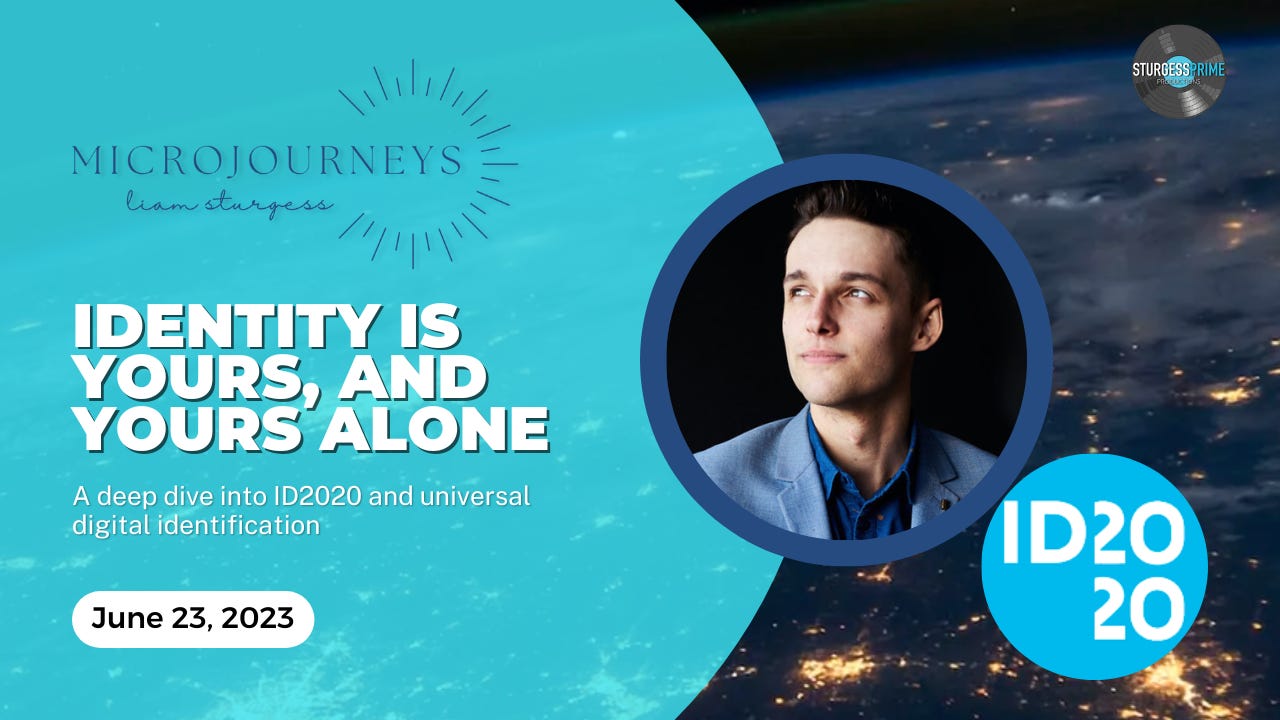
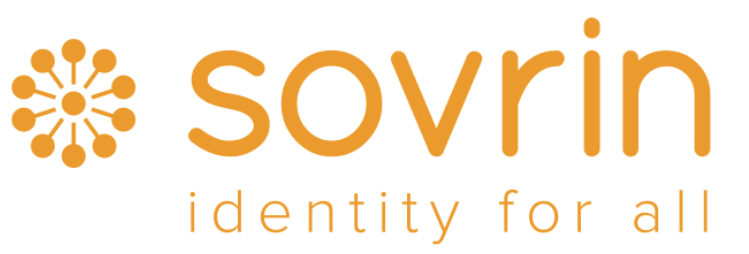

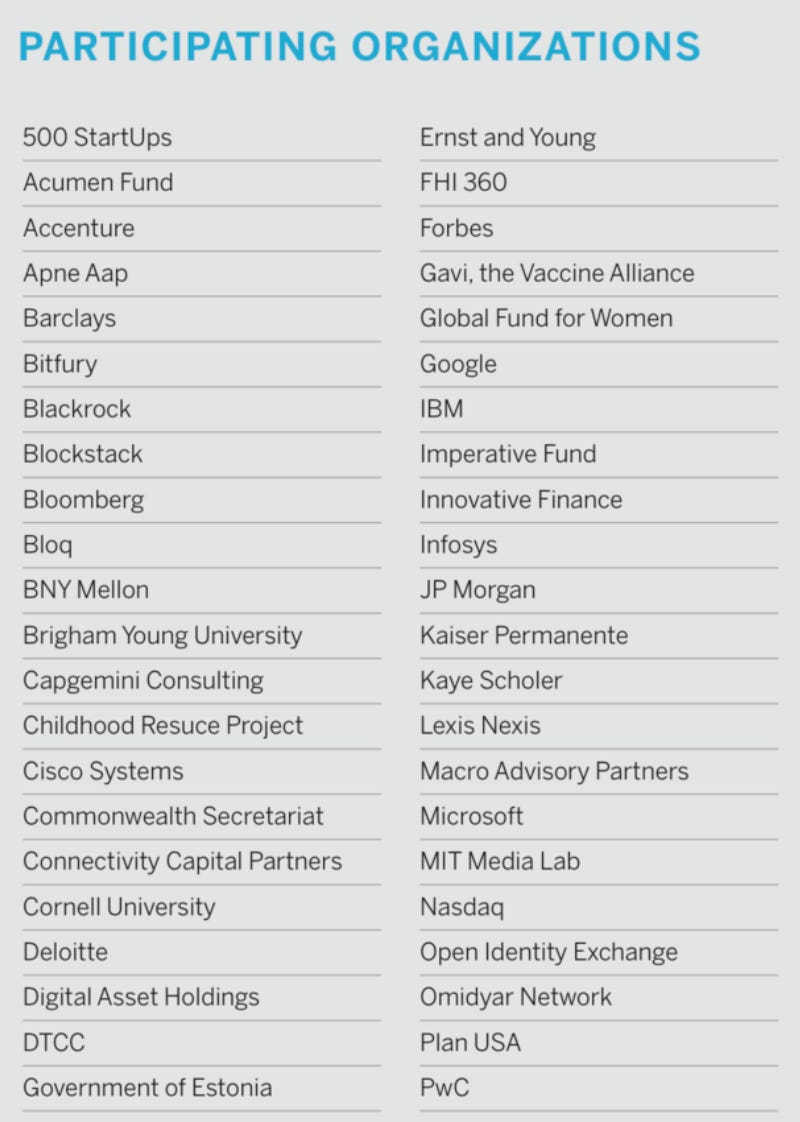
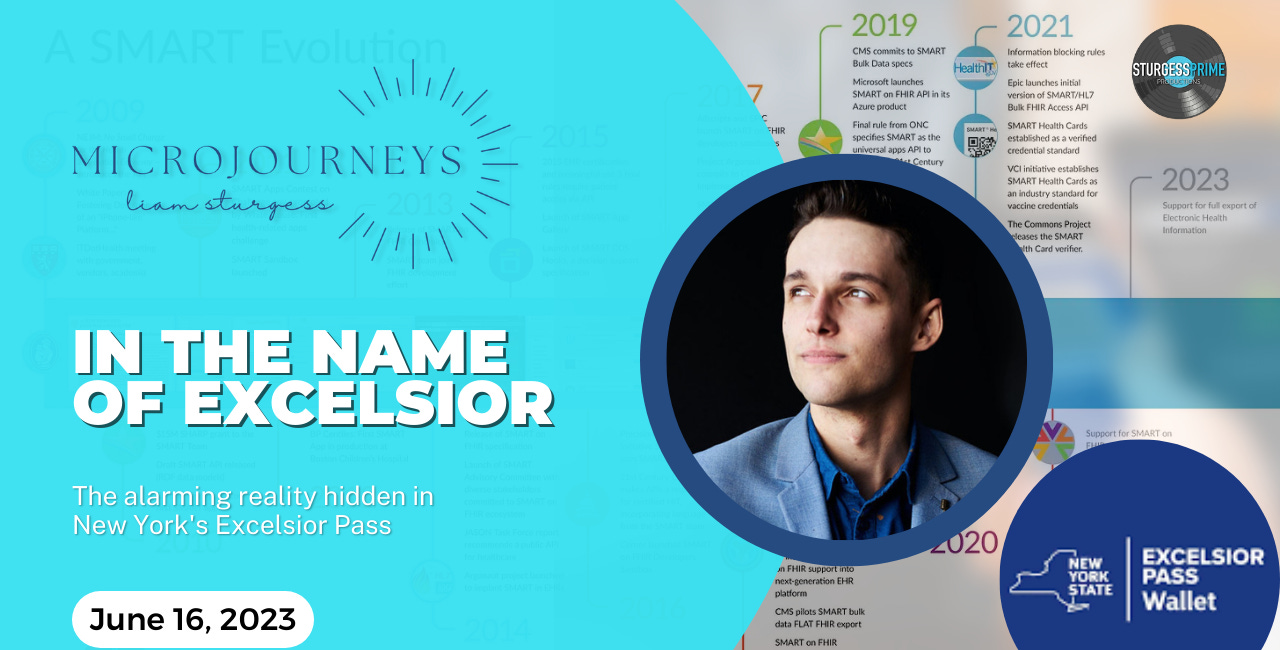

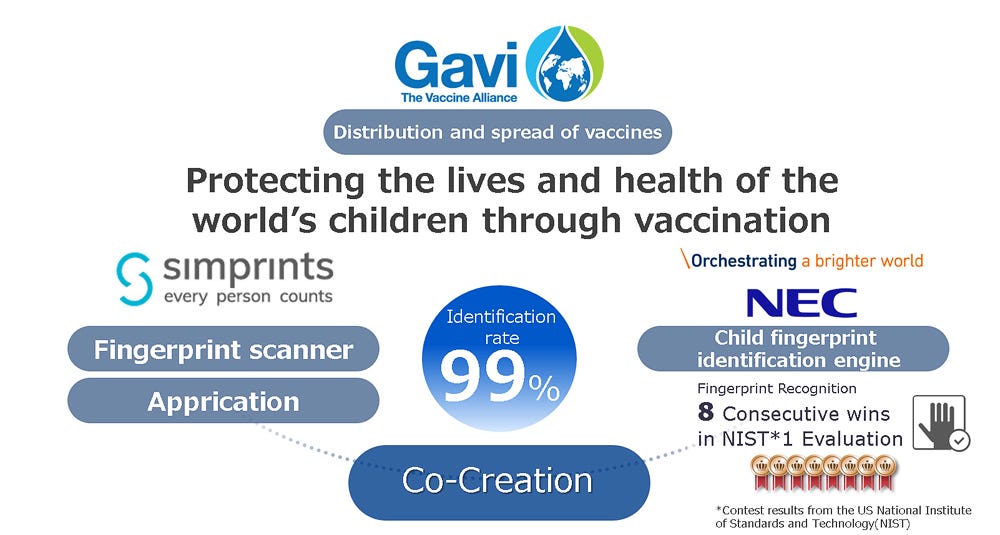
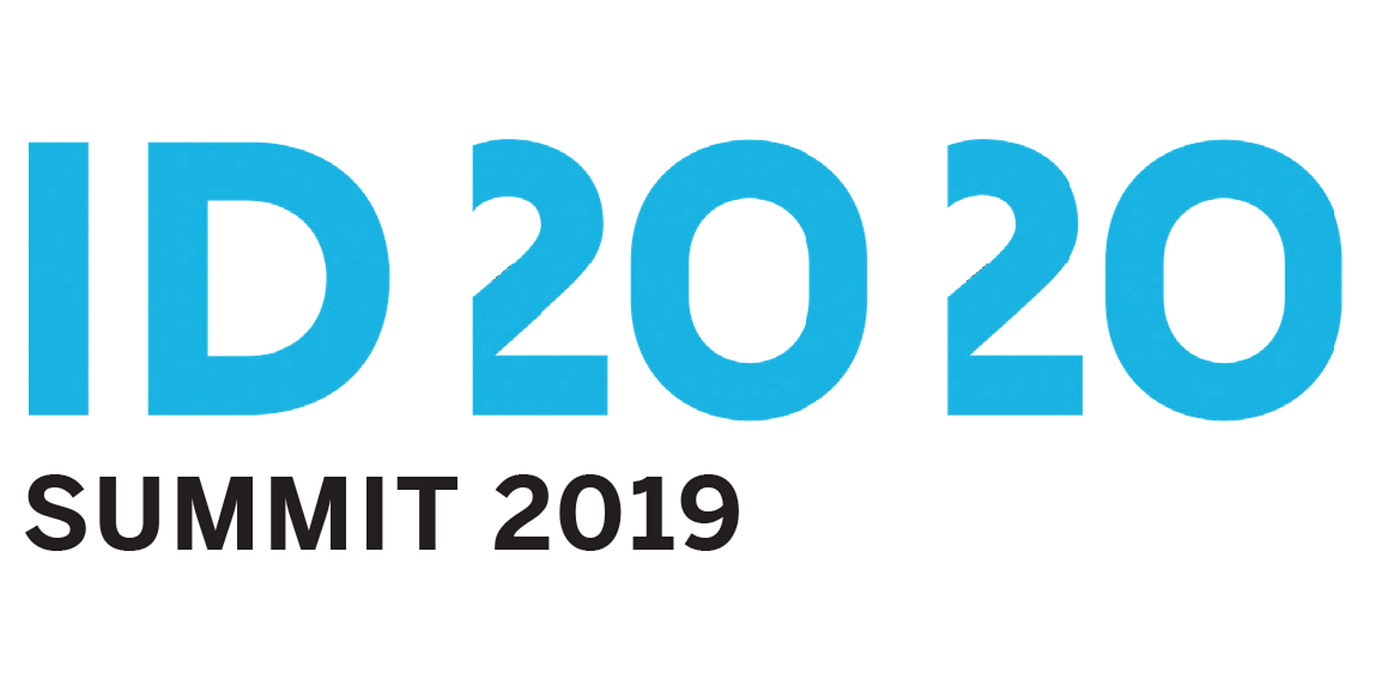
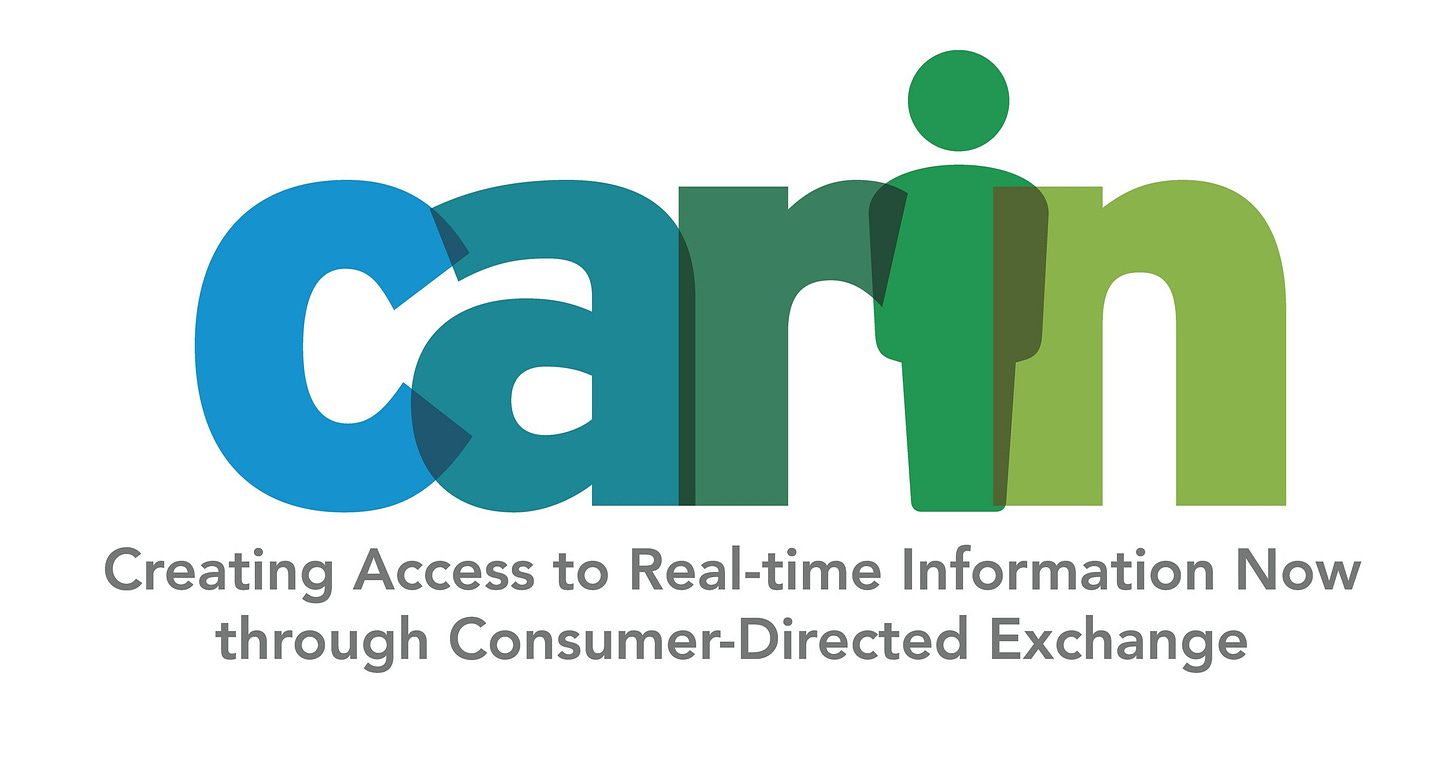
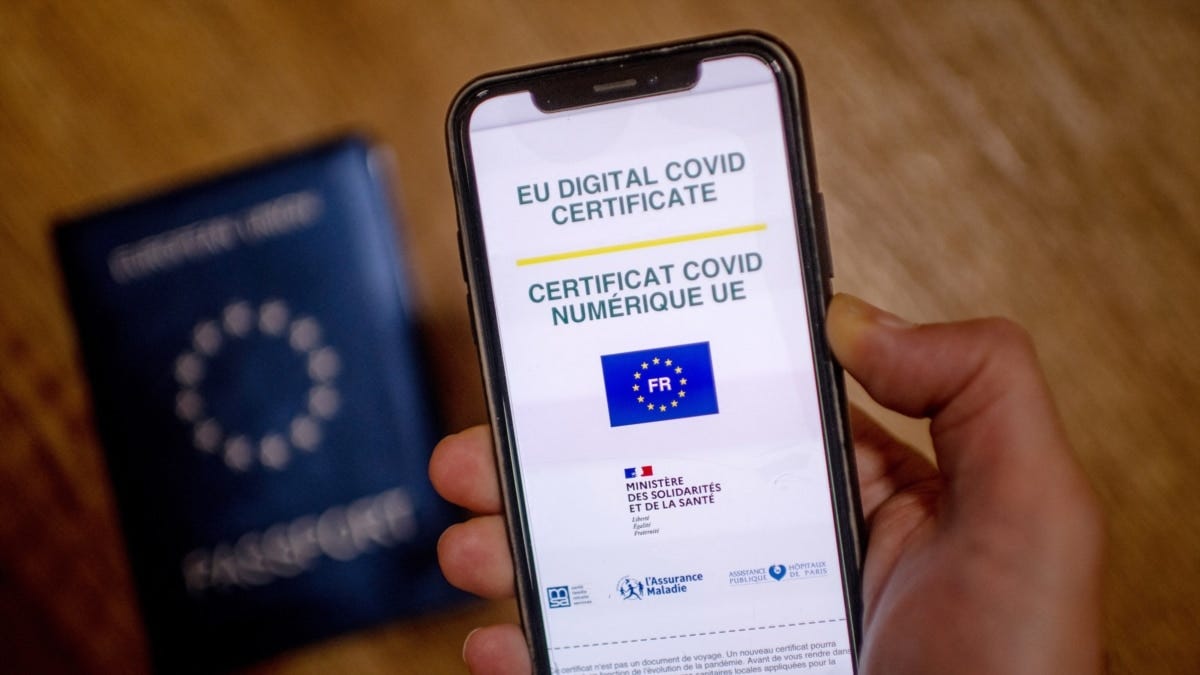
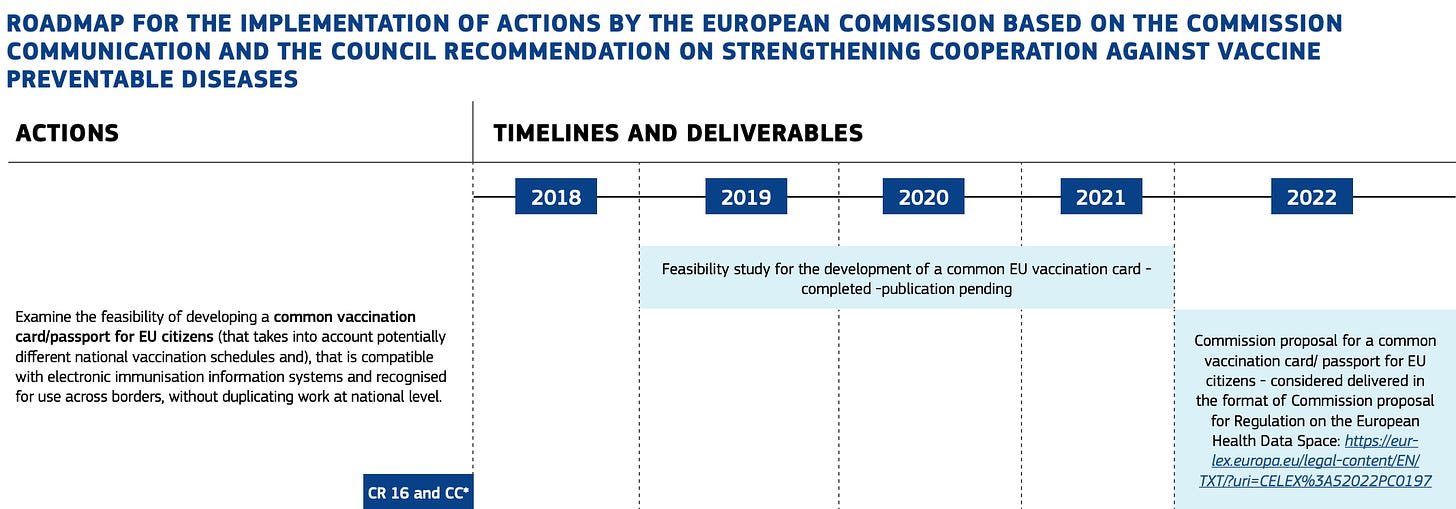
loved the song. Very good reporting. Thank you.
Liam, you are such a good researcher that I thought you might look into the Sequiris company.
https://www.csl.com/we-are-csl/our-businesses-and-products/csl-seqirus
This idea from Aaron Siri posting this today:
https://aaronsiri.substack.com/p/clinical-trial-to-license-rotateq
Look at the chart where vaccines are listed with control group information. Control groups are being given investigational vaccines. What!! I'm wondering about this because I believe I may have been affected by one or both of the last flu vaccines I took, the Afloria or Flucelvax. Werre jabs including mrna mixes before it was official? If I was as handy as you I would look into this myself.
Best to you.